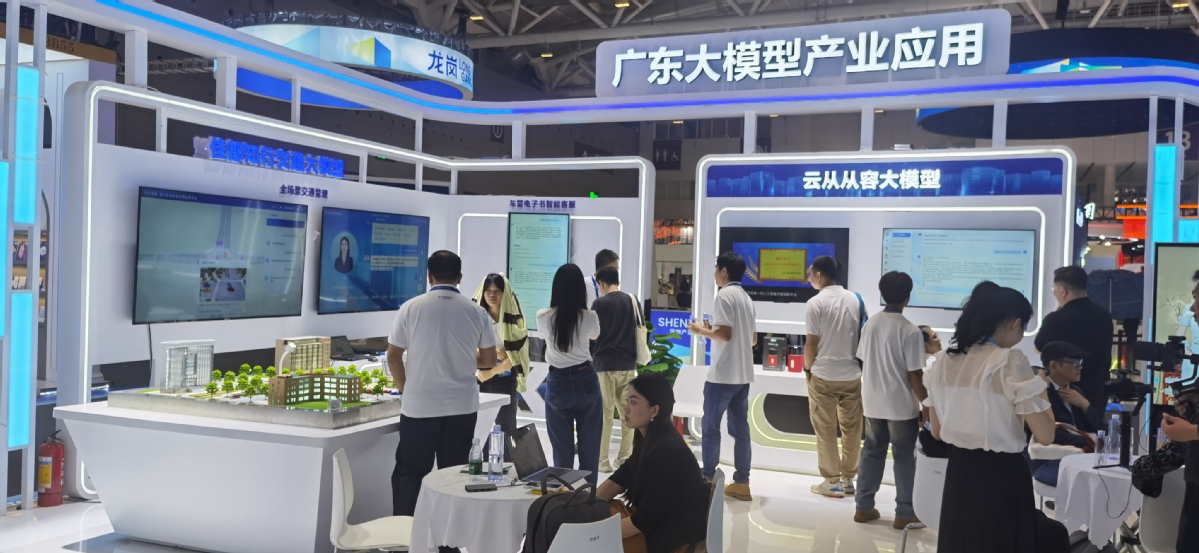More firms embracing generative AI tools
By FAN FEIFEI | China Daily | Updated: 2024-06-04 09:48

About 85 percent of Chinese business leaders plan to increase investments in generative artificial intelligence in 2024, as AI and other disruptive technologies evolve to be more human-centric and drive greater capabilities for people to amplify their potential and reinvent commerce, according to global consultancy Accenture.
Accenture said in a new survey that 73 percent of Chinese company executives are prioritizing investments in strengthening their organizations' digital core capacities including cloud, AI, platforms and security.
Generative AI refers to computer algorithms trained with huge amounts of data capable of generating content such as images, text, audio and video. It is the key technology underpinning US-based research firm OpenAI's ChatGPT.
The findings stated that 93 percent of surveyed executives in China agree that the way they interact with data will change, from searching for information to asking questions and receiving direct advice and responses.
However, just 13 percent of business leaders in China are "extremely confident" that they have the right data strategy and core digital capabilities in place to effectively leverage generative AI to their maximum benefit.
To enhance employee productivity and drive growth, 70 percent of organizations in China are incorporating cutting-edge tools like generative AI, but less than a third of these businesses are actively reskilling their employees to harness such technologies, it added.
This indicates that while surveyed business leaders recognize the importance of generative AI on a personal level, there is a noticeable lag in commitment to workforce training. The research surveyed 2,800 company executives, with 225 from China, between February and March 2024.
Accenture also found that the world is in the midst of a massive technology shift, as AI and other disruptive technologies become "human by design" — much more humanlike and intuitive — and usher in a new era of unprecedented productivity and creativity.
It noted that as much as 40 percent of all working hours will be supported or augmented by language-based AI, and generative AI has the potential to enable productivity enhancements across 900 different types of jobs.
Yu Yi, technology lead at Accenture Greater China, said the important seismic shift in the way people work, live and learn will accelerate a wave of unprecedented change across industries, from retail and entertainment to medicine and manufacturing.
"Human-centered technologies like generative AI are poised to unleash human potential and deliver a staggering array of business and societal benefits, but only if we take a balanced, 'human by design' approach that ensures these technologies are used fairly and responsibly," Yu said.
About 93 percent of executives in China agree that with rapid technological advancements, it is more important than ever for organizations to innovate with purpose, according to Accenture.
Joyce Yi, managing director and operations delivery lead of Accenture Greater China, said Chinese enterprises are more willing to spend money on sales and product development in the process of AI applications, while their investments in enterprise operations are relatively less.
For businesses to maximize generative AI benefits and drive growth, company executives must extend their focus beyond immediate tasks and embrace a long-term and people-centric approach to adopt generative AI, said Zhang Xun, managing director from strategy and consulting at Accenture Greater China.
"Enterprises need to invest in transforming work, workflows and their workforces so they can reinvent themselves for success in the age of AI," Zhang said.
Industry experts said generative AI has become a major driving force for bolstering the innovative development of the digital economy, and its integration with the real economy is speeding up, which will promote the digital transformation of industries and the industrialization of digital technologies.
Major Chinese tech heavyweights, including Alibaba Group Holding Ltd, Baidu Inc, Tencent Holdings Ltd and iFlytek, have ramped up efforts to develop their own AI-powered large language models.
"China's major advantages in developing AI lie in abundant data resources and diversified industrial application scenarios, while the US has taken the lead in basic AI research, chips, algorithms and other crucial technologies, as well as a sound innovation ecosystem," said Wang Peng, a researcher at the Beijing Academy of Social Sciences.
Chinese enterprises should pool more resources into improving the quality of data that satisfy the training of LLMs, optimizing algorithms, cultivating talent specialized in the field of AI and expanding cooperation with leading international AI companies, Wang said.













